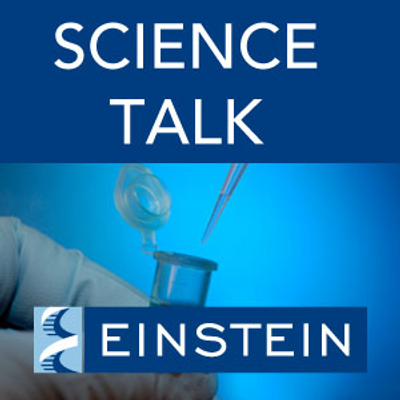
Science Talk
English
Technology & science
Limited Offer
2 months for 19 kr.
Then 99 kr. / monthCancel anytime.
- 20 hours of audiobooks / month
- Podcasts only on Podimo
- All free podcasts
About Science Talk
A Forum Where Einstein Scientists Discuss Their Latest Research
All episodes
65 episodesScience Talk: Antibody Neutralizes Two Deadliest Ebola Virus Species
http://www.einstein.yu.edu - Jonathan Lai, Ph.D., and colleagues have engineered the first antibodies that can potentially neutralize the two deadliest strains of the virus that causes Ebola hemorrhagic fever. The findings were published online January 13 in the journal Scientific Reports. Dr. Lai, associate professor of biochemistry at Albert Einstein College of Medicine, and John Dye, Ph.D., branch chief of viral immunology at USAMRIID, were co-leaders on the study.
Science Talk: Antibiotics May Thwart Sickle Cell Crisis
http://www.einstein.yu.edu - New research on sickle cell disease by Paul Frenette, M.D., has found that using antibiotics to deplete the body’s microbiome may prevent acute sickle cell crisis and could offer the first effective strategy for warding off the disease’s long-term complications, such as organ failure. The findings were published online on September 16 in the journal Nature. Dr. Frenette is professor of medicine and of cell biology and chair and director of Gottesman Institute for Stem Cell and Regenerative Medicine Research at Albert Einstein College of Medicine.
Science Talk: Survey Finds Miscarriage Widely Misunderstood
http://www.einstein.yu.edu - Results of a new survey of more than 1,000 U.S. adults has found that misperceptions about miscarriage and its causes are widespread. Results of the survey, conducted by Dr. Zev Williams show that guilt and shame are common and fewer than half of respondents say they received adequate emotional support from the medical community. The findings were published online on May 11 in the journal Obstetrics & Gynecology. Dr. Williams is director of the Program for Early and Recurrent Pregnancy Loss (PEARL) at Albert Einstein College of Medicine and Montefiore Health System and is assistant professor of obstetrics & gynecology and women’s health, and of genetics, at Einstein.
Outsmarting Ebola Virus: Innovative Research on Treatment
http://www.einstein.yu.edu - Kartik Chandran, Ph.D., explains the novel strategies he and his colleagues are using to develop treatments for Ebola viral infections. Watch 3-D animations showing how Ebola enters a cell and delivers its payload in order to replicate and spread throughout the body. Dr. Chandran is associate professor of microbiology & immunology at Einstein. Major funding for this research is provided by the NIH, U.S. Defense Threat Reduction Agency, Chan Family Foundation, and Albert Einstein College of Medicine.
Translational Research: Lab Vs. Real World HIV Prevention
http://www.einstein.yu.edu - With the help of animations, Betsy Herold, M.D. shows why some drugs that prevented HIV and herpes transmission in the lab failed to protect women in clinical trials. See how proteins in semen act as an “invisibility cloak” for HIV and herpes viruses allowing them to bypass drugs and infect cells. Using lab techniques informed by clinical results, Dr. Herold conducts translational research on the next generation of drugs to prevent HIV and HSV infection. She is professor of pediatrics and of microbiology and immunology at Albert Einstein College of Medicine and chief, division of pediatric infectious diseases at The Children’s Hospital at Montefiore.
Choose your subscription
Limited Offer
Premium
20 hours of audiobooks
Podcasts only on Podimo
All free podcasts
Cancel anytime
2 months for 19 kr.
Then 99 kr. / month
Premium Plus
Unlimited audiobooks
Podcasts only on Podimo
All free podcasts
Cancel anytime
Start 7 days free trial
Then 129 kr. / month
2 months for 19 kr. Then 99 kr. / month. Cancel anytime.





































